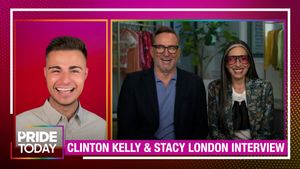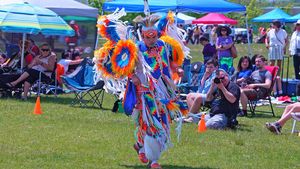Producer/DJ Ezra Rubin, known simply as Kingdom, explores duality through his music, both in its sound and the femme vocalists he features on top. His songs bridge the soft sensuality of classic R&B with the aggressiveness of underground club beats, creating post-modern soundscapes that have attracted fans like Kelela, Dawn Richard and SZA, three artists Rubin now credits as close collaborators.
Released through his label Fade to Mind, Rubin's work with these artists is a symbotic exchange, despite male producers oft getting overly credited for developing women in music. As a queer man, singers like Kelela (who tapped Rubin for her Cut 4 Me mixtape and debut album Take Me Apart) allow him to freely channel his femininity, creating liberated music together that's entirely gender-free--neither masculine nor feminine, just as it's neither dark nor light.

This balanced approach to electronica comes together on Rubin's freshman full-length, titled Tears in the Club, with tracks that could soundtrack pained heartbreak on the dancefloor or euphoric joy beneath a strobelight. They're all deeply emotional, but just like Rubin's repertoire, revel in nuances. His intent is never clearly defined, but the open-ended sentiment all the more universal.
Now a year after his LP's release, Rubin has returned with an extended version, Tears XL, featuring new vocals, instrumentals and remixes from his debut effort. We caught up with the tastemaking producer to talk about his queer NYC origins and working alongside so many femme powerhouses.
OUT: You got your start in NYC, creating soundtracks for Hood by Air runways and throwing queer parties. Talk through those early memories.
Ezra Rubin (Kingdom): My first DJ gig ever was actually with designer Telfar, who's an old friend of mine and just won the CFDA award, so I'm super excited about that. This is back in 2007--he was doing a party and invited me to DJ, and I had never even played before. Telfar just knew I was into good music, so he kinda started my DJ career. I was DJing with him once a month, and then me, him and another DJ got a residency together that was once a week.
From there, I met Shayne Oliver and a whole bunch of other people--downtown kids doing fashion and styling. Shayne approached me to do music for, I believe it was, his second time ever showing clothes, and it was at a small gallery. He's always had these super unexpected references that he wants to combine, and it's been pretty inspirational to me--the different kinds of obscure things he'll bring to the table.
Related | OUT100: Shayne Oliver, Stylemaker of the Year
How did this era impact the music you make today?
It's changed a lot. Back then I was really focused on remixing, but I think I've really progressed into songwriting and working with vocalists. I still try to integrate that unexpected, experimental energy into my vocal music. But back then it was more collage-based, and making a runway soundtrack is kinda like making a mixtape with faster transitions. Shayne wanted machine guns, and for it to sound like a war with ballroom suddenly mixed in--that constant change of context is what keeps the runway soundtrack exciting. That's stayed with me, but I've since grown into making original songs.
What were the parties like that you threw in the late 2000s?
I'd been throwing parties since before my label Fade to Mind formed, and when I think back, some of my early parties were really amazing meeting points for artists I'd see blow up later. I had a little party in 2007 called Club Vortex, and it was a mix of different cultures, and gay and straight mixing together. I remember people like Telfar, Le1f and Jay Boogie (when he went by Princess) would come. A lot of the kids were underage, too, because I threw it at a gallery that wasn't checking IDs. Young LGBTQs were coming to my events, and many would eventually release their own music, or become producers or designers.
Related | Jay Boogie Enlightens on Jesus Loves Me Too
How did you start collaborating with Kelela?
We met through Total Freedom, and she was standing on a couch singing over someone's instrumental she had on her iPhone, like plugged into the DJ booth. I was really blown away. She had an awesome presence, her voice was great, and she seemed to be really into singing R&B over pretty heavy electronic beats. From me, she started talking to Fade to Mind co-founder Prince Will, who would drive her around in his car and play her all the different bass line beats. From there, we had her start singing over them.
A lot of the beats on Kelela's Cut 4 Me were things we'd already made, which is why that project is kind of a mixtape. By putting her voice on them, it elevated the songs to another level. It was just another meeting through friends--that's how the whole Kelela thing started. It's all been an organic process of meeting collaborators who aren't really seen, who have their own unique perspective and are really driven and musical, but also experimental. All of them are queer-friendly, but I've never said out loud that those are requirements--it was just the people I met that got the vibe.
You've worked with a lot of women throughout your career. As a queer man, do you feel more comfortable collaborating with them?
Yeah, I think as a gay man, there's definitely that cliche that's like, "We love the divas and follow them through the eras." I feel there is a safety when working with women. Even as a child, I've looked to female vocalists. They were always really inspirational to me. But when I look at the charts and at the radio, there's such a lack of female voices sometimes. Right now in R&B and rap, there's still a lack of women. Artists like SZA, Kelela and Solange are definitely changing that and pushing that forward, but there's still an underrepresentation of women, and especially women of color on the charts. So that's another reason: there's a void that needs to be filled.
Do you feel you have a responsibility to support women in music?
I don't think I have a "responsibility" to. They have their own power and ability to push their own individual movements because they have their own unique visions. I think more and more female artists are producing their own projects. I'm really excited to see that because I can't sit here and say, "I'm the platform they can build upon." I'm not that. I just love to see them shine. I'm inspired to make records, and then see them perform on stage. The audience probably doesn't even know I made the beat, but to see artists bring our song to life is entirely why I do what I do.
There have been moments working with these artists where I've helped them by holding up a mirror to show them what they're projecting. I'm also really just obsessed with certain sounds, and sometimes artists come to me for my specific take on sound, which is a little bit sexy, a little bit dark, but also really clubby and, at times, heavy.
How have women helped you embrace your femininity?
I feel that working with women and collaboratively expressing ourselves together, definitely helps me ventilate the feminine side of my personality. That's when I get to let that side of me speak. I'm experimenting more and more with vocals, too, not to be released as me singing, but as a demo for someone else. That allows me to write from a more feminine perspective.
Related | Dawn Richard Finds Herself in the Color- and Gender-Blind World of Redemption
How has it been collaborating with Dawn Richard (DWN)?
I love Dawn. Speaking of someone who has their own movement--of all the people, Dawn is the most self-starting, motivated hustler of anyone I've ever met. She's completely unstoppable. She's fiery, she's talkative and in constant motion. I've never seen her sit back and relax. I think she found our music through our work with Kelela, and then dived deeper and looked through our other beats. I feel like working with Fade to Mind brought her back to something she worked on more early in her career, like with Dirty Money and then some solo work. She had been exploring EDM and really robotic vocal textures, but we pulled things back to a more minimal, soulful place.
How about SZA? She sounds like a perfectionist.
She's changed a lot in the way she works since I first recorded with her several years ago. As far as I know, she made over 100 songs for her CTRL album, because she's an insane lyricist that comes up with ideas off the top of her head. She's just like "next beat," and moves on quite quickly. I think the harder part, not just for her but for all artists, is making those final decisions. Which ones are done? Which should we finish? But her rhythms are so unique--she basically has the flow of a rapper, but with incredible energy and control over her voice. I've watched her get even better even though she blew my mind the first time I met her.
Who are some new musicians you're excited about?
She has one vocal on my Tears XL album, but her name is Semma and she's an incredible singer from London. She has the most intense, impressive vocal range of anyone I've ever worked with. She can go super low, and then jump to Mariah Carey-level high whistle tones, which most people physically can't even do. Semma can fully do it, and do it live. She's blowing my mind and we're working on a bunch of music together, right now.
For this extended release, you tapped Sam Rolfes to create the cover art--the same artist who did Tears in the Club. How do you feel the artwork connects to the music?
I'm such a fan of his work and I think it made sense for me because there's something abstract about it, but it's also digital and there's a grittiness to it. I think that really works with my sound. With the art we made specifically for this album, I wanted to have there be this sense of tenderness and vulnerability, hence the ripped fabric and floral elements. But then there's this side of the freeway, fucked up and rough element, too. That makes sense to me when you think about the idea of crying in the club--a traumatic experience in the club or even euphoric happy tears happening in front of some big stack of speakers. The contrast of softness with these heavier club elements has always made sense to me.
Stream Kingdom's Tears XL, below.


























































































